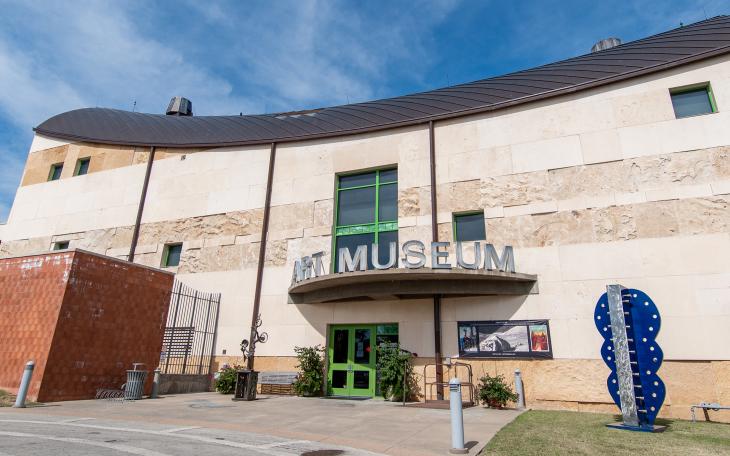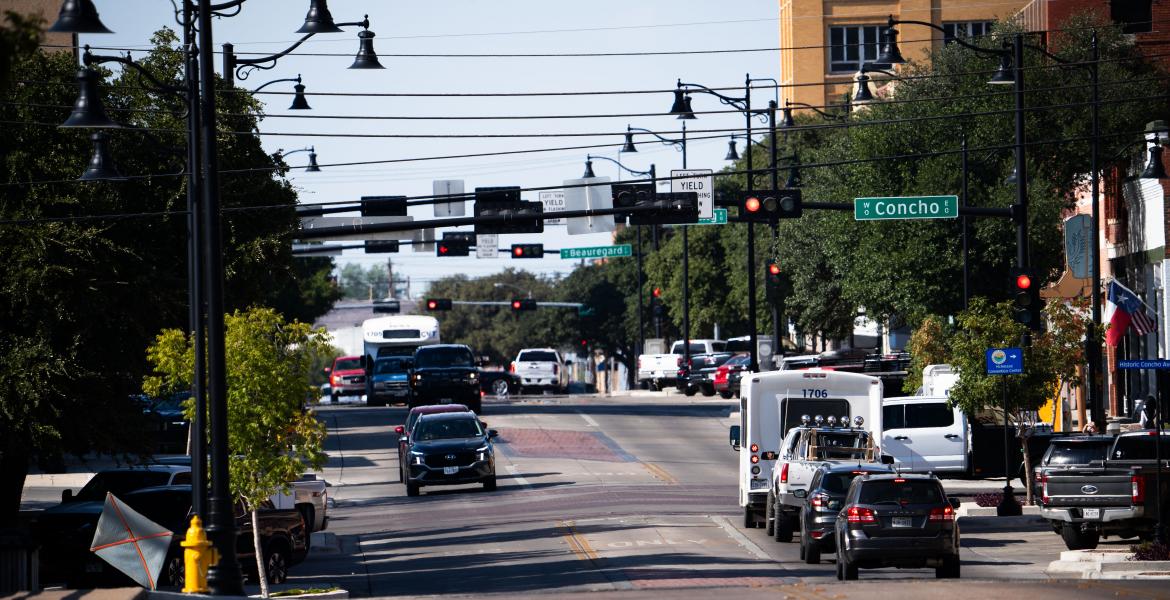By Stephen Simpson, The Texas Tribune
MIDWAY, TX — Some who live in Texas’ small towns say that if someone looks close enough, they will see why hemp-derived THC has taken root in rural regions.
Faded crosses on the side of the road and faces of once-promising teens on “Don’t drink and drive” and fentanyl overdose billboards reveal the scars left behind in the isolated parts of Texas, where tight-knit communities have been permanently changed.
Anti-drug hardliners can argue rural Texas’ struggle with substance abuse is why THC has proliferated there and why it needs to be banned, but many cannabis users in the state’s small communities say it has spared them from spiraling further into the destruction of alcoholism and drug addiction.
“I spent over 10 years in the fire service, and I can tell you have seen more fatality and messed up accidents because of alcohol than any other drug,” said Timothy Mabry, a hemp proponent from Canyon Lake. “Also, the difference between someone who is violently drunk and someone who is happily high is drastic. And many of us here have seen it firsthand.”
Hemp supporters say a ban on THC, which lawmakers are mulling, would be catastrophic to rural Texas.
The lack of access to the Texas Compassionate Use Program, the state’s tightly regulated medical marijuana program, and other traditional forms of medical care in those communities has steered users — even those who qualify for prescription drugs — toward consumable hemp products. This has unfolded as rural areas are home to some of the state’s sickest and oldest populations, many of whom are looking for relief from mental illness or chronic pain and find an antidote in cannabis use.
Amid growing addiction problems that hit rural communities harder than their urban peers, some have used hemp products to wean off alcohol or opioids, and farmers and small-town retailers are eager to meet those needs in hopes of boosting their downtown economies.
“My family lives in Belleville in Austin County, a big farm community with maybe 4,000 people total. That little town has maybe 30 storefronts, and three of them are hemp CBD shops. It’s a big part of the economy in these rural areas,” Andy “Doc” Melder, a Navy veteran and founder of Warriors Integrating Possibilities, a group aimed at ending veteran suicide and the opioid epidemic, especially in rural Texas.
On Wednesday, the Texas Senate passed Senate Bill 5 by Sen. Charles Perry, R-Lubbock, which would criminalize products containing any “detectable amount of any cannabinoid” other than cannabidiol and cannabigerol, better known as CBD and CBG, non-intoxicating components of cannabis. This bill would eliminate the majority of hemp products, including those that are legal under the federal definition.
Hemp opponents have given various reasons for a ban, saying the industry is unregulated, caters to children, and that the long-term health effects of cannabis use are still unknown.
The effort by Republican lawmakers who support a ban has spurred blowback from their usual ardent political allies: rural Texans, from farmers to veterans, and the older generation.
/https://static.texastribune.org/media/files/1199841abbf339def491431a9759f9f5/0729%20Rural%20THC%20AM%2012.JPG)
Limited access to medical marijuana
Texas has one of the largest rural populations in the country, with about 5 million of its approximately 31 million people living in rural areas. The health outcomes of Texans who live in these regions are significantly worse than their urban peers, partly due to the lack of physical and mental care access.
The inability to find help has driven some people to seek relief elsewhere.
“The funny thing is, my parents sent me to rehab when I was 15 for my cannabis use, and they hated the thought of it. Now they are using cannabis themselves for pain relief,” Melder said.
Some lawmakers have insisted the Texas Compassionate Use Program is the best route for cannabis users with mental illness and chronic pain. However, those who live in rural parts of the state don’t have access to those dispensaries, and if they do, products are expensive and limited.
“We don’t have additional options,” said Ramona Harding, a Navy veteran who lives on a 10-acre farm in Midway.
Currently, the state has two medical marijuana dispensaries, both of which are based in Central Texas, and a third one that has been deactivated, according to lawmakers. Because state law requires those dispensaries to drive products they sell in other parts of Texas back to a designated storage site every day, overhead costs are high, which has contributed to the expensive medical marijuana products.
A $15 bag of hemp-derived THC gummies purchased online could be more effective than a $75 bag of medical marijuana gummies, hemp supporters have said.
Many rural Texans also don’t have insurance to pay for the doctor’s visits required to sign up for the program and medical marijuana usually isn’t a covered benefit under most plans. The costs to participate start to add up, Mabry said.
“There is only a select number of doctors who can do it, so you have to travel, and anytime something touches a doctor's hand, it costs more,” he said.
Legislation passed earlier this year expanded the medical marijuana program by increasing the number of dispensaries and satellite locations while offering more types of products to users and removing the storage restriction. Medical marijuana producers say the law will help drop prices and increase accessibility but that it could take a few years to happen, including in rural Texas.
Even when the dispensaries expand, some families are unsure if it will still meet their complicated needs.
When Piper Lindeen’s son Zach became the second child to be accepted into the state’s medical marijuana program, she felt pride. After fighting for several years, she and her husband finally had legal access to medical cannabis products that could slow down their son’s severe seizures.
At least that’s what they thought.
Although the Lindeens still participate in the program, Zach needs to supplement it with other CBD because some of the chemicals removed the medical marijuana under state regulations are needed to stop their son’s seizures. They order hemp products from Oregon, which could become illegal if lawmakers approve a ban.
“There is no hope to control his seizures, and we tried,” the Sugar Land resident said of the medical marijuana program.
/https://static.texastribune.org/media/files/7af4b151ffc3603998dbf18df348f089/0729%20Rural%20THC%20AM%2004.JPG)
Combating alcohol and opioid addiction
In June, the Texans for Safe and Drug-Free Youth, the Alcohol and Drug Abuse Council of Deep East Texas, the Andrea’s Project in Amarillo, the Sheriffs Association of Texas, along with other anti-drug groups, sent a letter to Gov. Greg Abbott asking him to ban THC due to concern for children and the risk of impaired driving increasing.
Perry has said multiple times that cannabis might be responsible for veteran suicide, not preventing it, and has questioned the medical benefits since studies he has seen show long-term use causes dementia.
With all those risks and the lack of resources in rural communities to address them, some rural lawmakers like Perry fear THC could wreak havoc in the neighborhoods they represent.
Research has yet to definitively show what long-term impacts of THC use in a community can be, but rural users said they envision safer environments free from more dangerous addictions like alcoholism and opioid abuse.
“I know so many people who have used [hemp-derived THC] to get off tobacco, alcohol, or other pills… and I think that is one of the biggest things it could be used for,” Harding said.
All 177 rural counties in Texas are federally designated Health Professional Shortage Areas for Mental Health, meaning there are not a lot of addiction treatment options in these regions.
A 2022 study by UT Health San Antonio’s substance use disorder response program, Be Well Texas, found that more opioid prescriptions are dispensed to rural Texas residents per capita than to urban residents, contributing to increasing overdose rates and illegal drug markets.
For Harding, cannabis is how she can function each day, as she bears the physical and mental scars from a rape she endured while in service. If cannabis is taken away, she said her only other options are either the pills that were killing her liver slowly or alcohol, which killed her mother, father and brother.
“I have run into so many people and lawmakers who are like, ‘Well, go have some whiskey’. No. It killed my family, and it almost killed me. Alcohol isn’t the answer for everyone in Texas,” she said
/https://static.texastribune.org/media/files/1f8be1b7109a00c11d593aad7a458c53/0729%20Rural%20THC%20AM%2019.JPG)
The economic costs of a ban
While there isn’t specific data on how many THC shops have opened in the rural parts of the state, a 2025 report by Whitney Economics, which studies data and does economic reports on global hemp and cannabis industries, found the number of physical locations had increased from 5,072 in 2022 to 7,550 in 2024 and was steadily growing all around Texas.
Hemp-related licenses have increased steadily since 2022 for both retailers and manufacturers, the latter of which are usually located in the rural parts of the state. The $5.5 billion industry is estimated to employ more than 53,000 workers, receiving $2.1 billion in wages.
Rural Texas farmers told The Texas Tribune earlier this year that banning THC would mean they would have to stop growing hemp altogether, even if it’s not going to be consumed, because there’s no way to have or manufacture this plant with no detectable THC in it.
Whitney Economics estimated a complete THC ban would shift $10.2 billion in economic activity out of the state, and it would disrupt the hemp supply chain throughout the United States.
“The worst part is if this ban goes through, it’s going to send thousands of farmers, workers, retailers, and more around here and all over the state, belly-up, and for what? No reason,” said Mabry.
This article originally appeared in The Texas Tribune at https://www.texastribune.org/2025/08/01/texas-rural-thc-hemp-cannabis-marijuana/.
Subscribe to the LIVE! Daily
Required






Post a comment to this article here: